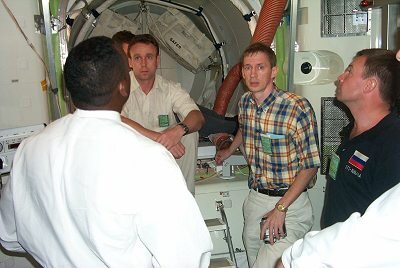Top officials and specialists from all space-faring nations meet at the first Space Safety Conference in Nice, France
ESA PR 46-2005. At the 40th IAF congress in Beijing, China, in October 1989 the then NASA Associated Administrator for Safety and Mission Assurance, George Rodney, concluded his presentation on Space Station safety with the following remark: "Over the long run, the safety of all human beings in the global commons of space is a responsibility that must be shared by all space-faring powers."
Despite these prophetic words and in contrast to what happens in the aviation world where an international organisation for aviation safety, the International Civil Aviation Organisation (ICAO), has existed for 60 years, safety issues associated with spaceflight are still dealt with today at individual national level. Most of the existing laws, agreements and safety regulations governing space activities were written to make it easier for governments to function in space.
In recent years marked by increased cooperation among space-faring nations and the arrival of new players, such as Brazil and China, and the first steps towards private space tourism, there has however, been growing awareness that it is time to reform and harmonise the existing legal and regulatory framework for space safety and make it easier for the private sector to undertake the development of commercial space activities.
Advancing space safety is not only a moral duty, but the key to expanding space programmes and making them more and more economically viable. Each space accident has a tremendous impact on the overall progress of the exploration and exploitation of space due to calendar delays, the drain on limited personnel and financial resources and loss of political and public motivation for new space endeavours.

In particular in the field of human spaceflight, international programmes, rather than national ones, will represent the norm in the future. However, there are important cultural differences that can increase the threat to safety. This applies to crew operations as well to development teams and goes far beyond the obvious language barrier. Cultural differences lead to differences in the approach to safety which originate in varying tradition, past experiences, environment, government policies and different degree of public acceptance of risks.
After a number of tragic accidents, hitting practically all space-faring nations, and the advent of new governmental and private human spaceflight endeavours, the beginnings of space tourism and the expansion of space exploration beyond low Earth orbit to the Moon and Mars, it is time to move forward with international cooperation in space safety and make a new start in the search for harmonised and coherent safety rules and standards, leading ultimately perhaps to the creation of a single international space safety organisation, similar to the ICAO in the aviation field.

This is the purpose of the first Conference of the International Association for the Advancement of Space Safety (IAASS) to be held in Nice, France, from 25 to 27 October 2005. Sponsored by ESA, NASA and JAXA, specialists from the space agencies, industry and research institutes of all space-faring nations, including in particular China, India, and Brazil, will come together to discuss the lessons to be learnt from space accidents, the prevention of human error, safety risk management, organisational culture of safety, safety on long-duration human space missions, emerging safety regulations for space tourism and many other relevant safety-related issues.
"International cooperation in civil space programmes is the way ahead and will become more and more important in the future. It will require uniform standards and innovative organisational solutions," explains Tommaso Sgobba, Head of the ISS Utilisation Product Assurance and Safety Office in the ESA Directorate of Human Spaceflight, Microgravity and Exploration, who as the IAASS President is the organiser of the first Space Safety Conference in Nice.
More information on the IAASS conference on "Space Safety, A New Beginning" and the "International Association for the Advancement of Space Safety" can be found on the Internet at: http://www.congrex.nl/05a15
http://www.iaass.org
For further information please contact:
Franco Bonacina
Head, ESA Media Relations Division
Directorate of External Relations
ESA HQ - Paris
Tel: +33 1 5369 7155
Fax: +33 1 5369 7690
Dieter Isakeit
Head, Erasmus User Centre and Communication Office
Directorate of Human Spaceflight, Microgravity and Exploration
Noordwijk (the Netherlands)
Tel: +31 71 565 5451
Fax: +31 71 565 8008
Tommaso Sgobba
Head, ISS Utilisation Product Assurance and Safety Office
Directorate of Human Spaceflight, Microgravity and Exploration
ESA/ESTEC - Noordwijk (the Netherlands)
Tel: +31 71 565 4944
Fax: +31 71 565 6132




